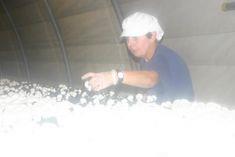
Jim Rowley is carrying out a project under the auspices of HRI Warwick for the UK mushroom production industry, to analyse the option of mechanising the mushroom harvest.
Just two months into the project, he has already made progress towards understanding the obstacles, the potential benefits and the design of an implementation model.
He said the fact that import penetration has demoralised the UK industry in recent times and significantly reduced the number of farms producing mushrooms - “90 per cent of production in the UK is restricted to 12 farms,” he said - has made the possibility of automation appear even more prohibitive cost-wise.
“It is a very segmented market, with a lot of small growers marketing their own product, and it is increasingly difficult to source the labour required to harvest mushrooms,” Rowley said. “Safety and ethical audits demanded by the supermarkets are adding to costs. And in the UK there is more of a demand for the fresh, individually selected type of mushroom, than from the processing market, which lends itself more to mechanisation.”
A joint Silsoe Research Institute/HRI pilot project in the mid 1990s established the feasibility of mechanical harvesting for the mushroom industry, but the two-year payback period it forecast put the hand-to-mouth industry off.
There is a strong argument to say that the bigger companies may have missed the boat, but Rowley believes that it is not too late yet.
“It needs more investigation,” he said. “Why were the findings of the project not taken up by the industry - was it a marketing issue, down to the fear of technology or to the apparently high capital costs? Or was it that the loan potential was not that good, compared say with that afforded to the Dutch industry?”
Rowley said that at this early stage of his research, he can see three options. “The industry could take up the Silsoe harvester, developed during the SRI/HRI project; it could adopt a suck-it-and-see approach by automating its picking process bit by bit and spreading the investment risk; or it could do nothing and take its chances,” he said.
“It is a highly complex issue. I haven’t seen many companies out there so far that have tackled it [automated harvesting] on a commercial basis. But we have seen the trends and things do not look too optimistic. Doing nothing is the worst of the three options.”



